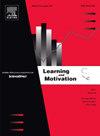Prediction error generated by extinction attenuates overshadowing in humans
IF 1.7
4区 心理学
Q3 PSYCHOLOGY, BIOLOGICAL
引用次数: 0
Abstract
Prediction error is a discrepancy between expected and actual outcomes in each situation (Torrents-Rodas et al., 2021). Experiencing extinction causes a rise in prediction error, which produces attention to the context, and thus context dependency. Behavioral measures of attention, such as responses to specific elements of a compound stimulus (Reynolds, 1961), have been previously proposed and can add another measure of the effect of extinction on attention and an insight into how attention changes when extinction occurs. The present experiment aimed to study the effects of prediction error produced by extinction on overshadowing through behavioral measures. Forty-eight participants were randomly assigned to four groups (n = 16) and trained to respond to Sample Stimulus (SS): Y, in a matching to sample task during a first phase. In the second phase, two groups experienced the extinction of SS: Y, while the other groups did not. All groups were trained to emit R1 responses to either compound SS: AX or SS: X during this phase. The test phase presented elements A and X separated. Results showed overshadowing when the extinction of SS: Y was not experienced, where the percentage of R1 responses was greater for A than X. However, when the extinction of SS: Y was experienced, both elements received similar responses showing an overshadowing attenuation. These results suggest that extinction produces an attentional change to X. This effect appears to be related to a rise in prediction error during extinction, which produces changes in attention.
消光产生的预测误差减弱了人类的阴影
预测误差是在每种情况下预期结果与实际结果之间的差异(Torrents-Rodas et al., 2021)。经历灭绝会导致预测误差的增加,从而产生对环境的关注,从而产生对环境的依赖。注意的行为测量,如对复合刺激的特定元素的反应(Reynolds, 1961),已经被提出,可以增加另一种测量消失对注意的影响,并洞察当消失发生时注意力是如何变化的。本实验旨在通过行为测量研究消光产生的预测误差对遮蔽的影响。48名参与者被随机分配到四组(n = 16),并在第一阶段的匹配样本任务中训练对样本刺激(SS): Y做出反应。在第二阶段,两组经历了SS: Y的灭绝,而其他组没有。在这一阶段,所有组都被训练对SS: AX或SS: X化合物发出R1反应。测试阶段呈现元素A和X分离。结果显示,当SS: Y消光不发生时,R1响应的百分比对A大于对x。然而,当SS: Y消光发生时,两个元素得到的响应相似,表现为消光衰减。这些结果表明,灭绝产生了对x的注意力变化。这种影响似乎与灭绝期间预测误差的上升有关,这导致了注意力的变化。
本文章由计算机程序翻译,如有差异,请以英文原文为准。
求助全文
约1分钟内获得全文
求助全文
来源期刊

Learning and Motivation
Multiple-
CiteScore
2.90
自引率
0.00%
发文量
53
期刊介绍:
Learning and Motivation features original experimental research devoted to the analysis of basic phenomena and mechanisms of learning, memory, and motivation. These studies, involving either animal or human subjects, examine behavioral, biological, and evolutionary influences on the learning and motivation processes, and often report on an integrated series of experiments that advance knowledge in this field. Theoretical papers and shorter reports are also considered.
 求助内容:
求助内容: 应助结果提醒方式:
应助结果提醒方式:


